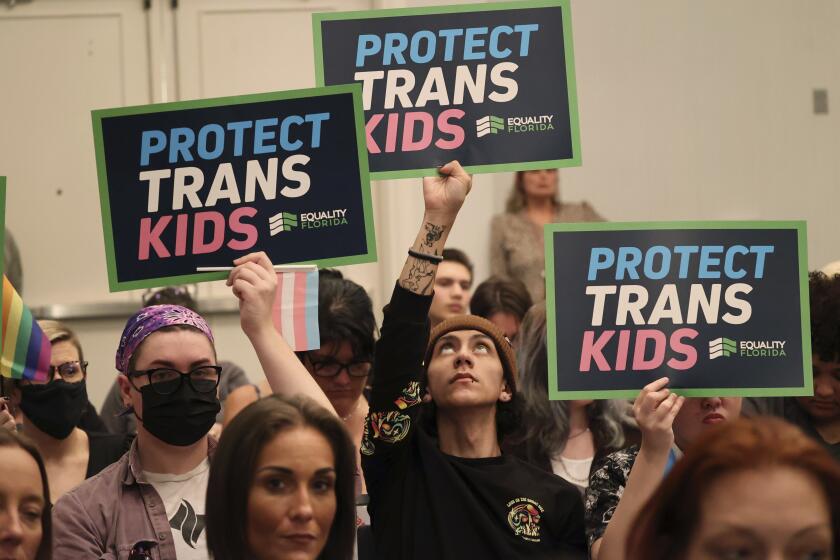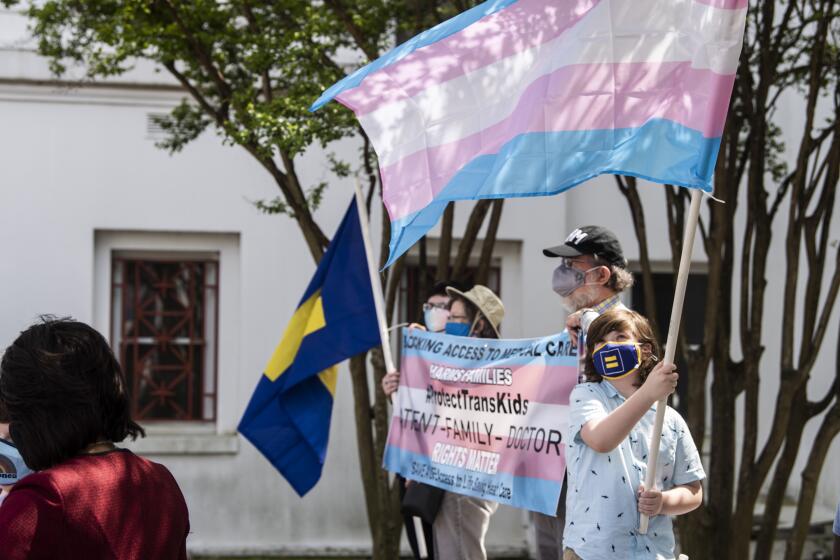Editorial: It’s time to scrap California’s ineffective travel ban to anti-LGBTQ states

- Share via
Almost from the moment that California’s lawmakers passed a law prohibiting state-sponsored travel to states that adopt anti-LGBTQ laws, it was clear that the ban was more problematic than productive.
The intention was to send a strong message to lawmakers in other states that California would not tolerate discriminatory laws targeting lesbian, gay, bisexual and transgender people and would choose to spend its public money elsewhere. But if the message was received, it certainly wasn’t heeded.
When the law went into effect in 2017, four states were on the prohibited travel list. There are now 23 states on the list, including Arizona, Texas, Georgia and Florida. With more than 450 bills filed so far this year that would enact discriminatory laws against LGBTQ people, the no-go roll is likely to grow — unless we dump the well-intended travel ban.
Forcing California teachers to notify parents that their kids are transgender would be harmful. Conservatives should stop wasting time on issues that hurt public education.
Scrapping this law in a time of growing political rancor between red and blue states isn’t going to be easy. But with state Sen. Toni Atkins (D-San Diego), who is Senate president pro tem and a lesbian, leading the effort there’s a good chance it may happen this year. Atkins has crafted a proposal that would repeal the travel ban and replace it with an outreach program to those same states. It’s a smart approach that is similar to one taken by the state’s two largest public pension funds when it comes to controversial investments; they prefer to use their influence as shareholders to lobby for reform. In many cases, direct engagement is more effective than divestment to make social change.
Senate Bill 447 would repeal the 2016 bill, written by Assemblymember Evan Low (D-Campbell), and create the BRIDGE Project (Building and Reinforcing Inclusive, Diverse, Gender-Supportive Equality), a donation-funded program within the Governor’s Office of Business and Economic Development. The new program could be used to create media campaigns in other states to discourage discrimination and support LGBTQ people who are feeling persecuted.
“People like me, when I was 18 years old and seeking that kind of support,” Atkins said recently. Atkins grew up in the Appalachian region of Virginia. She said that even then, more than 40 years ago, she saw California as a “beacon of hope” where LGBTQ people would find acceptance.
Column: Pronoun hysteria is pure MAGA politics, with a side of devastation for vulnerable trans kids
Victimizing an already marginalized community is an easy way for Republicans to whip up their voters
While Low and Equality California, a gay rights organization that pushed for the travel ban, haven’t yet signed on to the Atkins bill, they have indicated a willingness to discuss it. That’s good, because while the travel ban hasn’t influenced legislators in other states, it has negatively affected Californians. For example, the ban bars scholars at California’s public universities from attending academic gatherings or from conducting research in states on the prohibited travel list unless they can figure out workarounds. Students from public universities have to get private donations to compete in athletic games and academic competitions in those 23 states.
California’s lawmakers have also been hampered by the law. They had to use political donations to attend the National Conference of State Legislatures when the association met in Tennessee a few years back. In other cases, lawmakers have skipped events in prohibited states, missing an opportunity to speak with and perhaps persuade their more conservative counterparts.
The travel ban also threw a wrench into laws California leaders rushed to adopt to help pregnant women living in states that had passed abortion restrictions after the Supreme Court overturned Roe vs. Wade. Atkins said the state could pay for pregnant women to travel to California for an abortion — but not their trip home if those women live in states on the travel ban list.
That’s ridiculous, and so is maintaining a law that does more harm to California and Californians than its intended targets. California’s troublesome travel ban has to go.
More to Read
A cure for the common opinion
Get thought-provoking perspectives with our weekly newsletter.
You may occasionally receive promotional content from the Los Angeles Times.












